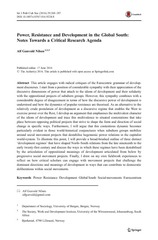| dc.contributor.author | Nilsen, Alf Gunvald | |
| dc.date.accessioned | 2017-03-17T08:30:12Z | |
| dc.date.available | 2017-03-17T08:30:12Z | |
| dc.date.issued | 2016-09 | |
| dc.Published | International Journal of Politics, Culture, and Society 2016, 29(3):269-287 | eng |
| dc.identifier.issn | 0891-4486 | |
| dc.identifier.uri | https://hdl.handle.net/1956/15599 | |
| dc.description.abstract | This article engages with radical critiques of the Eurocentric grammar of development discourses. I start from a position of considerable sympathy with their appreciation of the discursive dimensions of power that attach to the idiom of development and their solidarity with the oppositional projects of subaltern groups. However, this sympathy combines with a considerable degree of disagreement in terms of how the discursive power of development is understood and how the dynamics of popular resistance are theorised. As an alternative to the relatively crude postulation of development as a discursive regime that enables the West to exercise power over the Rest, I develop an argument that emphasises the multivalent character of the idiom of development and trace this multivalence to situated contestations that take place between opposing political projects that strive to shape the form and direction of social change in specific ways. Furthermore, I will argue that this contentious dynamic becomes particularly evident in those world-historical conjunctures when subaltern groups mobilize around social movement projects that destabilise hegemonic power relations in the capitalist world-system. To illustrate this point, I will provide a broad-brushed outline of three distinct ‘development regimes’ that have shaped North–South relations from the late nineteenth to the early twenty-first century and discuss the ways in which these regimes have been destabilised by the articulation of oppositional meanings of development articulated from below by progressive social movement projects. Finally, I draw on my own fieldwork experiences to reflect on how critical scholars can engage with movement projects that challenge the dominant directions and meanings of development in ways that can contribute to democratic deliberations within social movements. | en_US |
| dc.language.iso | eng | eng |
| dc.publisher | Springer | eng |
| dc.rights | Attribution CC BY | eng |
| dc.rights.uri | http://creativecommons.org/licenses/by/4.0 | eng |
| dc.subject | Power | eng |
| dc.subject | Resistance | eng |
| dc.subject | Development | eng |
| dc.subject | Global South | eng |
| dc.subject | Socialmovements | eng |
| dc.subject | Eurocentrism | eng |
| dc.title | Power, resistance and development in the global south: notes towards a critical research agenda | eng |
| dc.type | Peer reviewed | en_US |
| dc.type | Journal article | en_US |
| dc.date.updated | 2016-12-15T15:17:14Z | |
| dc.description.version | publishedVersion | |
| dc.rights.holder | Copyright 2016 The Author(s) | en_US |
| dc.identifier.doi | https://doi.org/10.1007/s10767-016-9224-8 | |
| dc.identifier.cristin | 1362399 | |

